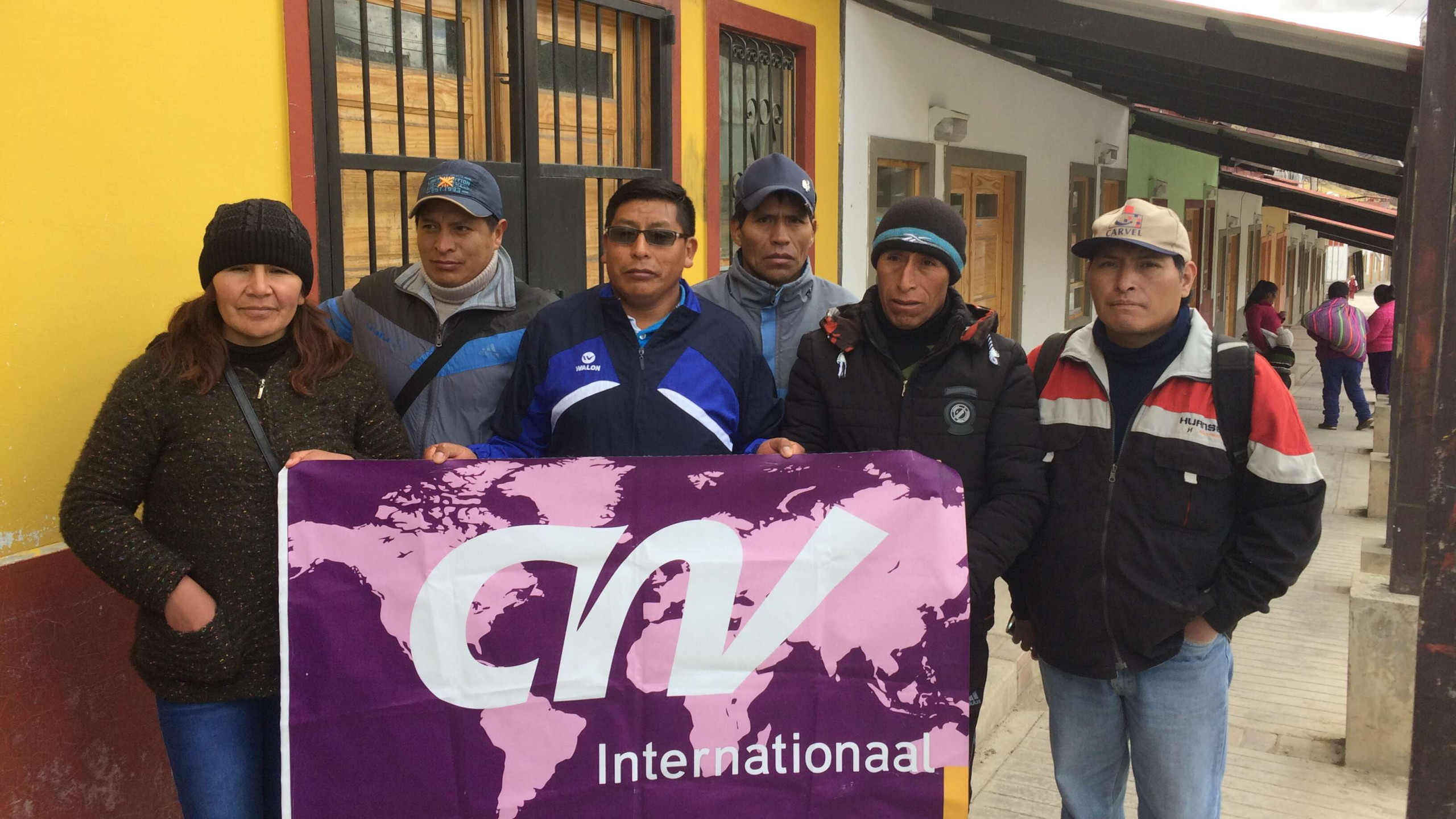Unions as essential interlocutors for fair work
Organizing in unions is a fundamental labor and human right. Officially called, "the Right to Organize. Every human being also has the right to bargain collectively over terms and conditions of employment. These rights are enshrined in international and national laws and regulations.
Unfortunately, in many countries, it is not easy to form unions or do union work. Establishing independent unions is then banned altogether or the initiators are prevented from registering. This may be for political or cultural reasons (and everything in between).


The role and duties of a union
Trade union freedom is essential for meaningful dialogue at the factory, sector and even national level. Trade unions negotiate on behalf of workers with the employer or an employer's representative on terms and conditions of employment for all workers. The result of those negotiations is laid down in collective bargaining agreements (CBAs).
These cover, for example, wages, working hours, pension arrangements, travel reimbursement and much more. These kinds of agreements cannot usually be achieved by individuals. Trade unions, however, are able to do so.
In addition, unions can negotiate with (representatives of) employers on working conditions and more generally on the rights and obligations of employees. Trade unions also act to represent the interests of members. For example, in the event of dismissal or reorganization, they provide legal assistance and advice. They work hard to defend prevailing social values and standards regarding people and labor.
Trade unions are able to monitor compliance with workers' rights. They raise violations of these rights and work to prevent them.
Trade unions thus constitute a countervailing force that represents the interests of workers.
Freedom of choice between unions
An important factor for true union freedom is also pluralism. Only if more unions are allowed to coexist. will workers have the freedom to choose the union that suits them. It is also important to involve unions of different signatures in consultations and delegations.
Why union freedom is also important to employers
Trade union freedom promotes employee involvement in the company. This is also positive for companies. It allows employers to build long-term relationships with employees, with positive consequences:
- Trade union freedom reduces conflicts in the workplace, including between employees and management
- Labor productivity increases
- The union is the voice of the workers. Talking to the union provides a company with information about what is going on among the workforce
- A company that takes union freedom and labor rights seriously is more likely to be known as a "good company. This makes it easier to invest, for example, especially now that investors are also increasingly paying attention to social sustainability criteria.

What does union freedom mean in the context of chain responsibility and what is the impact on international production sites?
Chain responsibility applies worldwide, including in countries where governments are unwilling or unable to adhere to international labor standards.
This means that production sites:
- must allow workers to join unions or form unions (confirmed by workers)
- allow unions access to the factory or workers to share information
- allow paid time and space for worker representatives to participate in union activities
- not interfere with or attempt to influence any of the functions of unions
- not terminate contracts or punish, threaten, intimidate or harass employees and employee representatives because of their union membership or participation in union activities
- be willing to negotiate in good faith with a representative union the collective bargaining agreements
- not interfere with the right to strike
- in accordance with international standards where one or more of these rights are restricted by national law, comply with international standards to the greatest extent possible without violating national laws
Where national laws make compliance with international laws impossible, management should:
- make clear to employees that it will engage employees in collective dialogue, and
- ensure that employees have the opportunity and choice to participate in such collective dialogue through some form of representative structure.
It is important that factory history be taken into account when evaluating production sites. For, workers' past experiences, previous complaints or violations may influence current attitudes toward union organizing. Moreover, companies, together with suppliers, must take remedial action when violations of these rights are found.
Risks of lack of union freedom
In many countries, freedom of association is provided for by law and ILO conventions have been ratified, but compliance is lacking. Yellow Unions (yellow union) are also common. These are unions established by a government or employer, or that lack sufficient independence from an employer.
By entering into a collective bargaining agreement (CBA) with this company union or sham union and excluding other unions from negotiations, the right to collective bargaining can effectively be undone.
Local governments sometimes have double standards. On the one hand, they have legislation that recognizes union freedom and dialogue. At the same time, they sometimes create industrial areas called free economic zones (export production zones, or free trade zones) to stimulate the economy. Here, international companies are given extra latitude but independent trade unions are denied access.
The companies operating there then ask no questions about this. They believe that what is legally allowed cannot be wrong. But that's not how it works. The OECD Guidelines and the UNGPs state that if laws do not meet international standards, the company is supposed to come as close as possible to complying with the international guidelines.
Often defined policies in a company apply only to permanent employees. So not for flex workers and hired workers. It is then difficult and risky for them to join a union or stand for election as union leaders. After all, they can easily be sent away as soon as their temporary contract ends.

Flex workers in Peruvian metal mines joined a union for the first time-with support from CNV Internationaal
Trade union freedom in directives and treaties
Guiding Principles on business and human rights (UN)
It has been agreed internationally that governments must protect human rights - and thus labor rights - and that businesses must respect them.
OECD Guidelines
OECD Guidelines Chapter 5: Employment and Industrial Relations
Universal Declaration of Human Rights, Article 23
According to Article 23 of the Universal Declaration of Human Rights, everyone has the right to form and join trade unions for the protection of his or her own interests.
Conventions of the International Labor Organization ILO
Various aspects of trade union freedom are enshrined in various conventions of the tripartite UN labor organization ILO that have been ratified by many countries. These are the most important ones that deal with trade union freedom:
- Freedom of organization (ILO Convention 87)
- The right to bargain collectively (ILO Convention 98)
- The provision of relevant training (ILO Convention 117)
- The right to protection of workers' representatives (ILO Convention 135)
Good practice examples from CNV Internationaal
Flexible workers - like these miners in Peru - also have the right to be represented by the union of their choice
Multi-company collective agreements - are a sustainable way to work toward better work
Publications and checklists on union freedom
Trade union freedom checklist - agrifood sector
CNV Internationaal has developed a handy checklist of questions that representatives of international companies in the food sector can ask. In this way, they themselves can gain better insight into what the situation is with regard to trade union freedom in practice at suppliers and foreign branches. We made this together with the IMVO covenant for the food sector, Fair Trade, FNV and Global March
Checklist Trade Union Freedom - Clothing Industry
CNV Internationaal has developed a handy checklist of questions that representatives of international companies in the clothing industry can ask. In this way, they themselves can also gain a better understanding of what trade union freedom is like in practice in their foreign branches or with suppliers.
Publication: The Power of Trade Union Freedom
In this thematic bookletwith practical examples, CNV Internationaal discusses how trade union freedom works, what it brings and what role companies themselves can play to promote it.
Fact sheets: Trade union freedom in the textile industry
The Importance of Freedom of Association and Collective Bargaining for Brands (ENG)
Trade union freedom and the right to bargain collectively are enshrined in Conventions C87 and C98 of the UN Labor Organization ILO. (Apparel) brands are expected to respect and take responsibility for these international conventions in force in most countries.
The General Factsheet contains the most important information on trade union freedom and collective bargaining and provides practical guidance for brands to get started on this topic.
In addition, CNV Internationaal developed a specific fact sheet for Bangladesh.


